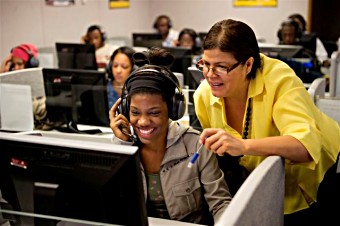Answering a ‘call to action’ in many tongues

The Foreign Language Instructional Center (FLIC) at the University of Maryland Eastern Shore was founded in response to a call to action: America needs more citizens who are fluent in other languages.
UMES partnered with the U.S. Department of Education in 2008 to create the Title III-funded activity specifically to teach less-commonly taught languages – especially those deemed critical to national security.
Since its founding in 1886, UMES has a long history of being a place where more than English is spoken and taught. FLIC is burnishing that tradition in the 21st century.
FLIC boasts a state-of-the-art language learning classroom featuring some of the most high-tech instructional capabilities available. Faculty can have two-way voice and media communication with each student, a select group or with a class of 20. Gone are the days of cassette tapes; everything is digital.
Instant assessments are possible at any point. Rosetta Stone®, Euro Talk® and 101 Languages® are used to complement traditional instruction, which in turn translates into more speaking time. Students can simultaneously practice the language while speaking into their headsets. Moreover, a number of other online resources also are used to teach the “cultural texture” of places where the language is spoken.
FLIC devotes resources to less-commonly taught languages. Arabic, Chinese and Haitian Creole have been added to the curriculum, which brings the number of foreign languages offered by the Department of English and Modern Languages to five (along with French and Spanish).
As more custom teaching materials are developed, plans call for more languages to be added.
FLIC also works to develop foreign language instruction for K-12 students in area public schools. Increasing the number of high school graduates who speak a second language is an important step in increasing the overall number of Americans who speak a foreign language.
Area agencies get help from FLIC to train medical, law enforcement or social service personnel who work with Hispanic and Haitian populations. Non-credit classes in Spanish and Haitian Creole for these target audiences are offered on a recurring basis. Personal enrichment classes as well as customized training also are available.
Individuals who require an assessment of their foreign language skills can visit FLIC for an Oral Proficiency Interview administered by the American Council on the Teaching of Foreign Language. This widely-recognized certification is useful in career or academic settings where evidence of foreign language skills is required.
Opportunities abound for individuals who can speak a second language. Learn more about FLIC’s language training programs at www.umes.edu/FLIC.

